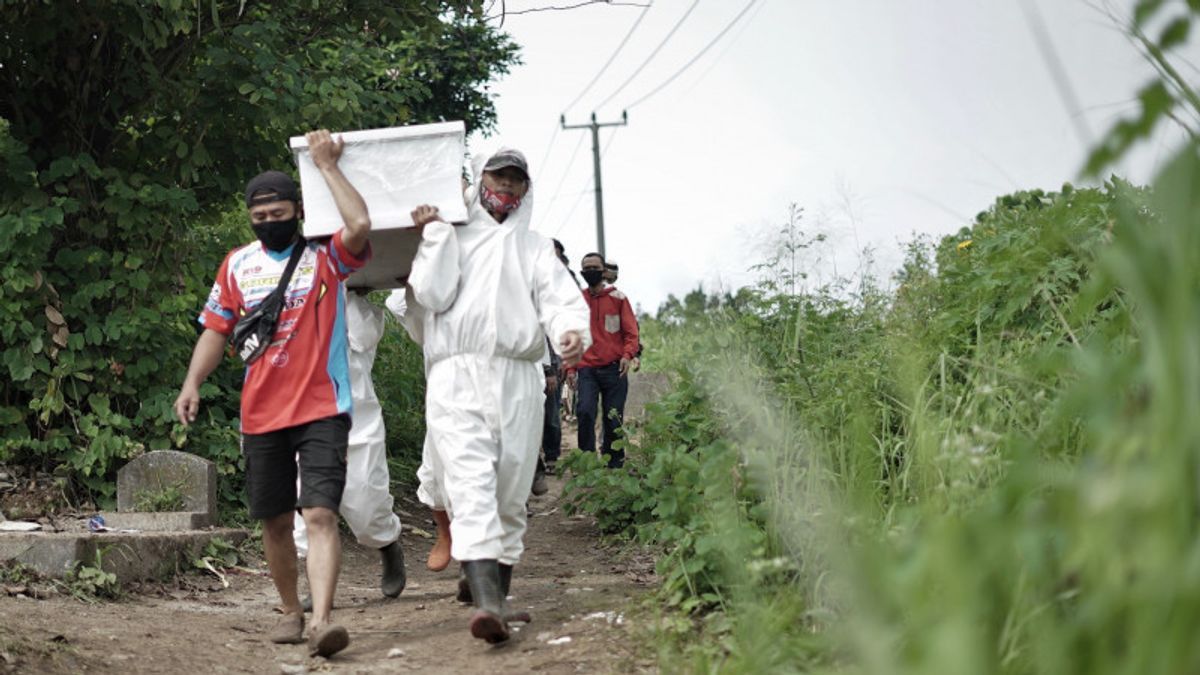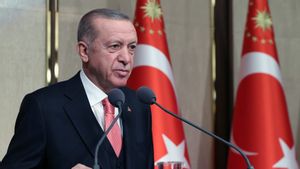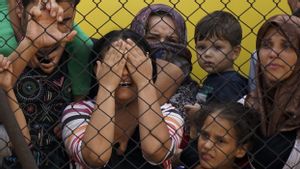JAKARTA - Indonesia recorded 1,007 daily COVID-19 deaths on Sunday, July 11. This figure is the second highest death record in the world. The result of the government's mishandling of COVID-19 is increasingly visible. In addition to an apology from Jokowi, the failure to handle this pandemic also urges a more literate DPR: alert and evaluative.
The previous day, Saturday, July 10, Indonesia was still the third country with the most deaths with 826 people. That day India still occupies the number two position with 899 deaths. The top position is still occupied by Brazil with the death toll of 1,172 people.
In addition to the daily deaths that overtook India, data from the COVID-19 Task Force on Sunday also showed the daily cases of COVID-19 increased to 36,197. With this, there are a total of 2,527,203 cases of COVID-19. Meanwhile, the total number of deaths reached 65,457. The data also showed 32,615 cases recovered daily.
The case of COVID-19 in Indonesia has indeed returned to the critical stage for some time. Since last week, July 3, the government established the Emergency PPKM policy as an effort to deal with the pandemic after months of undergoing problematic policies.
Urge apologyAs the pandemic situation in Indonesia worsens, demands for the government to apologize for its failure to handle the pandemic have strengthened. But until yesterday, no apology has been heard, either from President Joko Widodo (Jokowi) or other related officials.
In his latest appearance, Jokowi expressed his condolences for the deaths of COVID-19 patients. Jokowi also asked all parties to pray for the victims who died and those who were in treatment for a speedy recovery.
"On this occasion, on behalf of myself and on behalf of the government and country, I express my deep condolences to all the victims of the pandemic who have known us," said Jokowi during the #PRAYFROMHOME event which was broadcast live via the Presidential Secretariat's YouTube, Sunday, July 11.
The initiator of the Covid-19 Report platform, Irma Hidayana, is one of the voices demanding the government's apology. He said the government should apologize for the spike in cases of contagion and rising deaths. It is nothing. This condition has been predicted by experts.
"We have often heard experts convey their inputs on the pandemic situation that occurred over a span of 1.5 years," said Irma in the LP3ES online discussion, July 5.
"We feel that what is happening in the field at this time has not reflected the input, criticism, offer of contributions that we voiced were heard, accommodated and implemented."
"So please acknowledge this situation which is already an emergency and in disarray, apologize and provide concrete assistance."
What is the failure of the government?Irma Hidayana is right. In epidemiology the growth of cases is always predictable. Although it is impossible to be completely accurate, there is a model that can be used as a strategy reference. And the problem we see today is evidence of handling a pandemic that is not schematized in a clear and measurable grand design.
The government is considered negligent in implementing policies that should be science-based and health-oriented. One of the earliest signs of the government's failure to anticipate is the oxygen crisis and the collapse of health facilities when a spike in cases occurs.
"Scientifically, yes, it can be predicted. Rough estimates, but yes. But it will still help with a relatively close range. It can be the basis for strategies to anticipate. The predictions and worst-case scenarios are to increase the response so that it doesn't happen. So response mitigation ," Griffith University epidemiologist Dicky Budiman told VOI.
Many consider the explosion of cases today as the impact of human movement in the Lebaran season. May be. Another version calls the new variant of COVID-19 Delta the culprit in the explosion of cases. Can be. But there is another, more serious problem.

The explosion of cases today could be wider as the accumulation of mishandling of the pandemic by the government for one year. "I once predicted at the beginning of the year that in the first six months of 2021 we will experience a very critical period," said Dicky.
"Because the critical first three months are a response to prevention. Because this wave will increase towards the peak. And it is an accumulation of one year. So it can be predicted that the saturation point will be reached in June-July. That's ancer-ancer," he added.
We need to go back to April 2020 to dive into Dicky's modeling logic. At that time, the World Health Organization (WHO) determined that Indonesia's COVID-19 pandemic situation had reached the level of community transmission. It is the worst siren in the fight against the pandemic.
At the community transmission level, the authority -- state, city or state -- ideally establishes a total lockdown. Fiji, Brisbane, to Gaza are in total lockdown when they hit that level. Indonesia, what is the government doing?
There is slack in terms of government policy. Dicky alluded to three basic strategies for handling the pandemic - 3T (testing, tracing, treatment), vaccination, and restriction of mobility - which did not work well. This can be seen from the modeling showing the wavelength of COVID-19 in Indonesia.
"Then the government's response is getting better, stronger, the peak is reached quickly, it slopes quickly. That's the good thing. So if a country has a long, long wave, it means that the intervention failed."
"Indonesia has been at the community transmission level since April 2020 until now. This means that there are many cases of infection and this cluster is not detected so that it continues to grow, this case breeds."
Apologies from Jokowi and the DPR are more evaluative DPR
Political researcher from the Indonesian Institute of Sciences (LIPI), Aisah Putri Budiarti, explained that there were political consequences that the government had to bear from an apology. At its simplest, apologizing means admitting mistakes made.
"In my opinion, if they later apologized, it would show that there was a mistake regarding the handling of COVID," said Aisah Putri alias Puput to VOI, Monday, July 12.
"Hospitals, medical personnel. The COVID Task Force may have tried its best. But the policy is slow, which then becomes a joint correction," added Puput.
Indeed, apologies are important. But if there is something else that is more concrete, it is encouraging the strengthening of evaluation. The function of parliament must be strengthened. Outside the context of the political composition of the opposition and the coalition, this increasingly critical situation must be addressed with crisis awareness.
If Jokowi says all must collaborate, it must start from the officials, both the executive and the legislature. All must get rid of practical political interests to solve common problems. The government must continue to be monitored. Their work must be evaluated.
So far, Puput sees criticism only from civil society groups. Their role is important as input. However, the formal evaluation and oversight functions remain in the hands of parliament. "Parliament has the function of supervising the work of the executive," Puput said.
"Now there is actually a gap to evaluate. And as public representatives, political parties actually have a role to see to what extent the work of officials in the executive is effective in overcoming problems in the public sphere," he added.
*Read other information about COVID-19 or read other interesting articles from Diah Ayu Wardani and Yudhistira Mahabharata.
Other BERNASThe English, Chinese, Japanese, Arabic, and French versions are automatically generated by the AI. So there may still be inaccuracies in translating, please always see Indonesian as our main language. (system supported by DigitalSiber.id)









